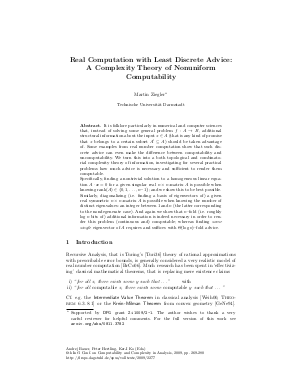Real Computation with Least Discrete Advice: A Complexity Theory of Nonuniform Computability
Author Martin Ziegler
-
Part of:
Volume:
6th International Conference on Computability and Complexity in Analysis (CCA'09) (CCA 2009)
Part of: Series: Open Access Series in Informatics (OASIcs) - License:
 Creative Commons Attribution-NonCommercial-NoDerivs 3.0 Unported license
Creative Commons Attribution-NonCommercial-NoDerivs 3.0 Unported license
- Publication Date: 2009-11-25
File

PDF
OASIcs.CCA.2009.2277.pdf
- Filesize: 446 kB
- 12 pages
Document Identifiers
Subject Classification
Keywords
- Nonuniform computability
- recursive analysis
- topological complexity
- linear algebra
Metrics
- Access Statistics
-
Total Accesses (updated on a weekly basis)
0PDF Downloads0Metadata Views
Abstract
It is folklore particularly in numerical and computer sciences that, instead of solving some general problem $f:A\to B$, additional structural information about the input $x\in A$ (that is any kind of promise that $x$ belongs to a certain subset $A'\subseteq A$) should be taken advantage of. Some examples from real number computation show that such discrete advice can even make the difference between computability and uncomputability. We turn this into a both topological and combinatorial complexity theory of information, investigating for several practical problem show much advice is necessary and sufficient to render them computable.
Specifically, finding a nontrivial solution to a homogeneous linear equation $A\cdot\vec x=0$ for a given singular real $n\times n$-matrix $A$ is possible when knowing $\rank(A)\in\{0,1,\ldots,n-1\}$; and we show this to be best possible. Similarly, diagonalizing (i.e. finding a basis of eigenvectors of) a given real symmetric $n\times n$-matrix $A$ is possible when knowing the number of distinct eigenvalues: an integer between $1$ and $n$ (the latter corresponding to the nondegenerate case). And again we show that $n$--fold (i.e. roughly $\log n$ bits of) additional information is indeed necessary in order to render this problem (continuous and) computable; whereas finding \emph{some single} eigenvector of $A$ requires and suffices with $\Theta(\log n)$--fold advice.
Cite As Get BibTex
Martin Ziegler. Real Computation with Least Discrete Advice: A Complexity Theory of Nonuniform Computability. In 6th International Conference on Computability and Complexity in Analysis (CCA'09). Open Access Series in Informatics (OASIcs), Volume 11, pp. 269-280, Schloss Dagstuhl – Leibniz-Zentrum für Informatik (2009)
https://doi.org/10.4230/OASIcs.CCA.2009.2277
BibTex
@InProceedings{ziegler:OASIcs.CCA.2009.2277,
author = {Ziegler, Martin},
title = {{Real Computation with Least Discrete Advice: A Complexity Theory of Nonuniform Computability}},
booktitle = {6th International Conference on Computability and Complexity in Analysis (CCA'09)},
pages = {269--280},
series = {Open Access Series in Informatics (OASIcs)},
ISBN = {978-3-939897-12-5},
ISSN = {2190-6807},
year = {2009},
volume = {11},
editor = {Bauer, Andrej and Hertling, Peter and Ko, Ker-I},
publisher = {Schloss Dagstuhl -- Leibniz-Zentrum f{\"u}r Informatik},
address = {Dagstuhl, Germany},
URL = {https://drops.dagstuhl.de/entities/document/10.4230/OASIcs.CCA.2009.2277},
URN = {urn:nbn:de:0030-drops-22770},
doi = {10.4230/OASIcs.CCA.2009.2277},
annote = {Keywords: Nonuniform computability, recursive analysis, topological complexity, linear algebra}
}
